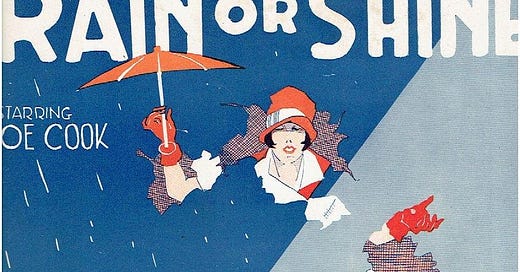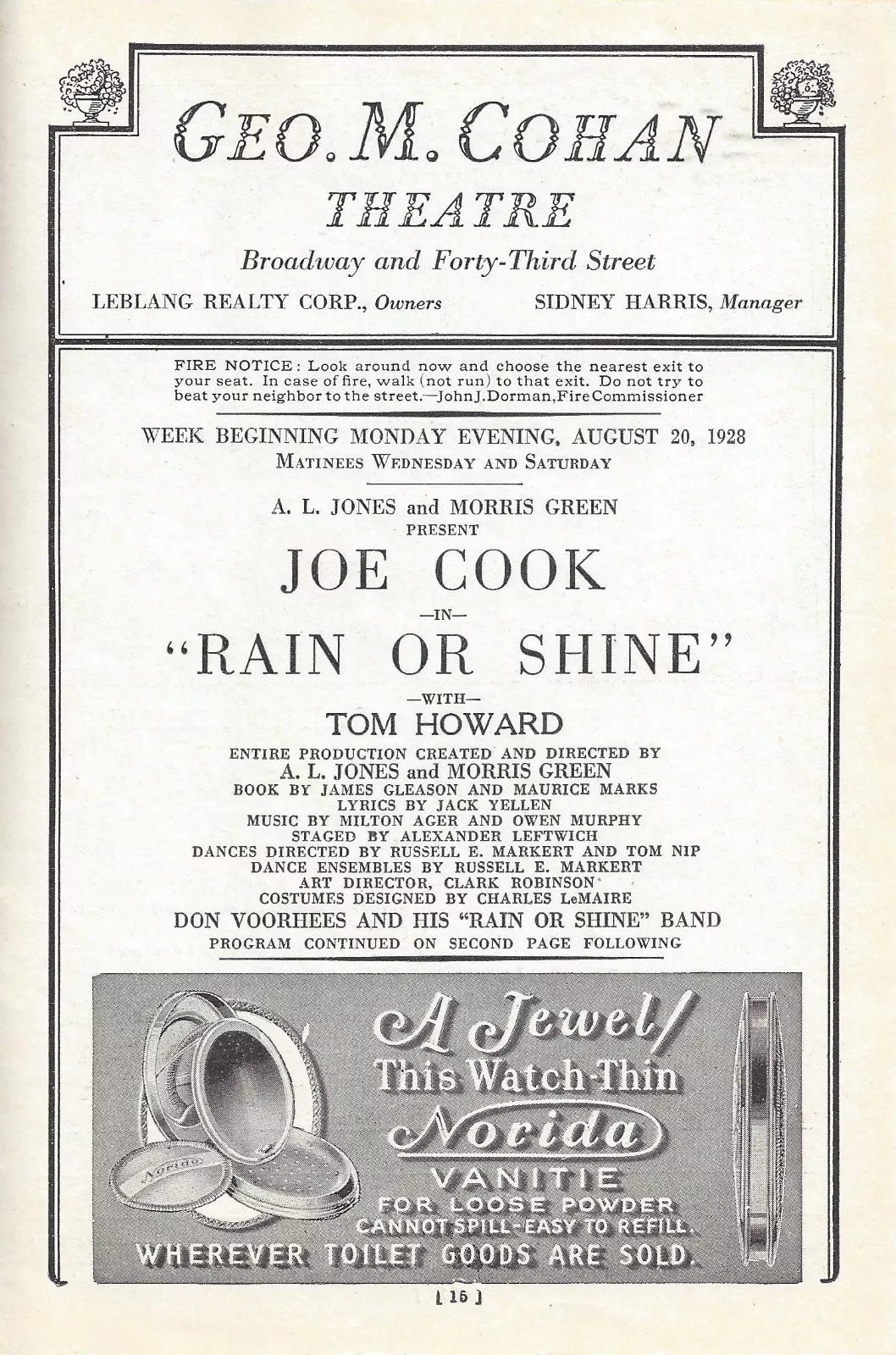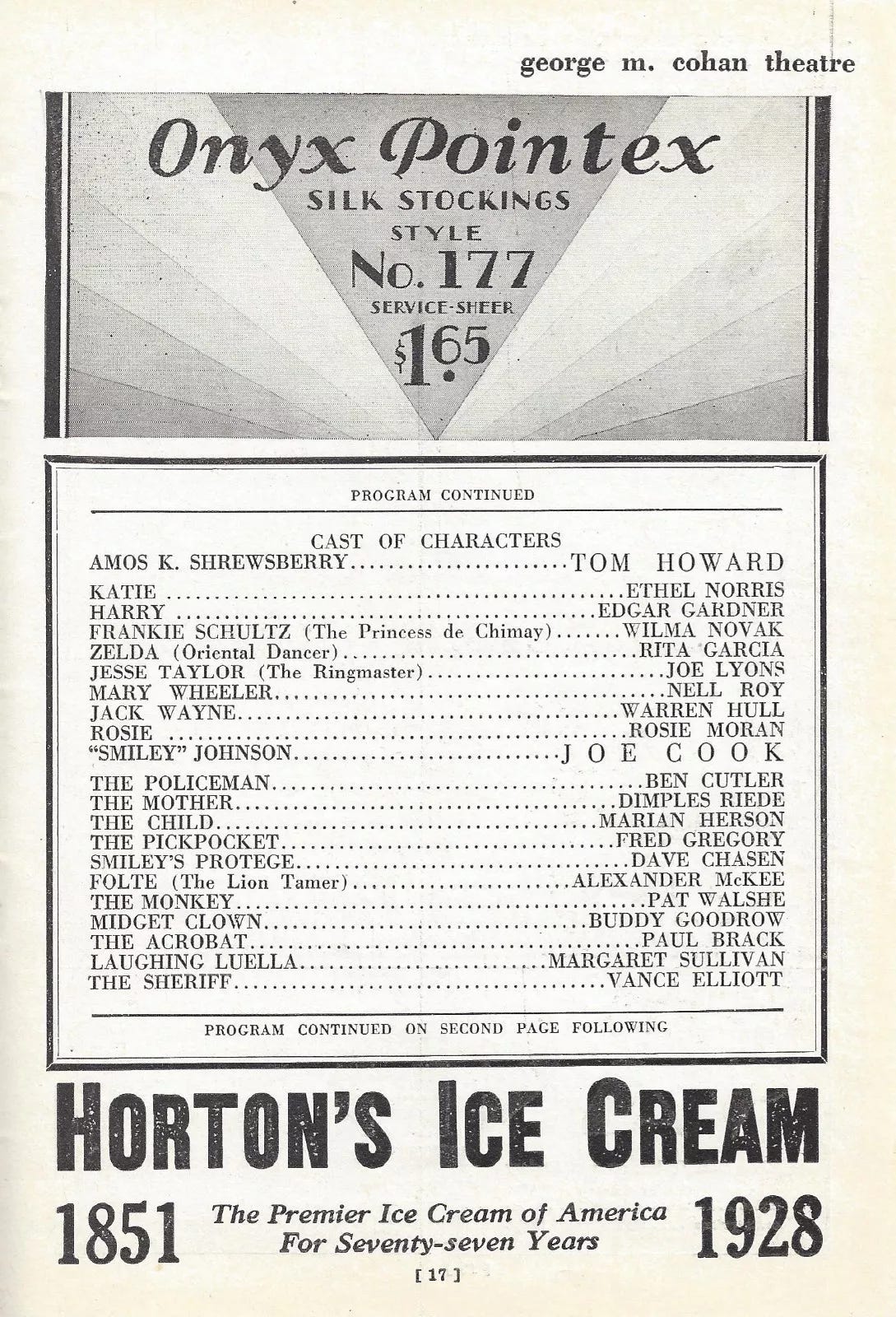The Final Word (Hopefully) on “Laugh, Clown, Laugh”
In Which (Surprise! Surprise!) The Clown Gets The Last Laugh
(Special Thanks to Michael G. Garber for writing most of today’s post.)
After three separate substack posts, I still haven’t reached the end of the story of “Laugh, Clown, Laugh” - or to be more accurate, I haven’t reached the beginning.
Our buddy, the exceptional pop music scholar Michael G. Garber (am eagerly anticipating his forthcoming book on early female songwriters), has come forward with the following revelation:
Michael: It is little known that “Laugh, Clown, Laugh” was introduced in the first act of the hit Broadway musical, Rain or Shine. After two months, however, “Laugh, Clown, Laugh” was replaced by a song called “Pierrot and Pierrette.” “Laugh, Clown, Laugh” was an interpolation (from the Remick firm), not by the writers of the rest of the score: Milton Ager and Jack Yellen (whose publishing house published the rest of the score) and Owen Murphy.
(WF: Michael’s discovery is verified by all the Broadway references I have checked. Oddly, none of the original recordings mentions the show Rain or Shine on the label, but then, for that matter, they don’t reference the MGM movie either. Famously the American edition of the sheet music features the film tie-in prominently, but not the UK edition.)
Michael: According to Edward Foote Gardner, “Laugh, Clown, Laugh” began to rise in popularity in May, presumably because the song was bought up by the MGM movie studio to be the theme song of the film of the same name. The movie, Laugh, Clown, Laugh, was released in the spring, which is when Gardner claims the song peaked in popularity. Online sources say the USA release date was either April 14 (perhaps the premiere date, or limited release date) or May 5 (perhaps the wide release date).
Rain or Shine was a star vehicle for comedian Joe Cook which opened on Broadway on February 9, 1928. Remick copyrighted "Laugh, Clown, Laugh" as a published work on February 28. (WF: The show ran 356 performances, until December 15, making it one of the bigger hits of the year, by 1928 standards. Rain or Shine was also filmed as a non-musical talkie in 1930.)
The story of Rain or Shine hinges on the troubles of an impoverished circus and their efforts to stay in business. Joe Cook played Smiley Johnson, a character who is very much in the mold of Captain Andy in Show Boat. (Which had opened on Broadway about six weeks earlier and was then currently the biggest hit of the 1927 season.) Although there is a happy ending, a major theme of Rain or Shine is the attitude of “smile through your tears and carry on.”
The young lovers are Mary, who grew up in the circus, and Jack, who is secretly a wealthy heir but has run away from his snobbish family and former fiancée to make his own life.
Near the end of Act One, there is a big circus dance number (“ballet”), during which Grocko the Clown (Vernon Jacobson) sings the song “Laugh, Clown, Laugh,” and Jack (Warren Hull) delivers a “Recitation” following “Laugh, Clown, Laugh,” one different from that in the sheet music. It’s the story of a clown who at first smiled for real, but then, unrequited in love, had to have a smile painted on instead. The recitation was dropped when the song was dropped.
(WF: Interestingly enough, the “recitation” was listed as a separate piece of music from the rest of the song, “Laugh, Clown, Laugh” - rather like in Camelot (1960) where there’s a separate piece of music titled “Madrigal” that is essentially the verse to “If Ever I Would Leave You,” but which is almost never performed alongside the rest of that song.)
Michael: Here is the recitation, taken from a copy of the script of Rain or Shine in the New York Public Library for the Performing Arts:
There’s a tale that’s found in circus lore,
And it tells that clowns in days of yore
Did not wear the painted leer or grin
That so often hides the tear within!
But they laughed and frolicked through their task
They were free from every woe or care,
And the smiles they wore their hearts put there.
Then there came a day, so I’ve heard them tell,
When a clown forgot himself and fell
Foolishly in love with a maid most sweet.
And that for a clown was indiscreet,
For the maid was the star of the circus troupe,
And how could the star of a circus stoop
From celestial heights, and look earthward down
To the hung’ring glance of a love-sick clown?
But the clown was young—he could dream and pray;
And his smile grew happier day by day,
And he played and danced with such joy and vim
That they laughed at none as they laughed at him.
And then one day the news was spread,
The pretty star that morn had wed!
No, not the clown who loved her so,
But the owner of the Big Top Show.
The performance was about to start,
When they told the clown—and crushed his heart;
And his lips grew taut and he choked for breath,
While his cheeks turned white with the hue of death.
But he took his place in the waiting file;
And he tried and tried—but he could not smile.
To the dressing room they rushed the lad
And upon that face so white, so sad,
There was painted quick a smile so wide
That the whole troupe roared as he stepped outside.
As he danced he wept o’er his fate so grim,
But they laughed at none as they laughed at him.
And from that time on it’s the circus style
For each clown to wear a painted smile.
So hide your tears, [chide and chaff!]
[originally, the line was: So hide your tears, bit of human chaff!]
Never mind your heart—laugh, clown, laugh!
WF: One additional question: the recitation is not credited anywhere to Fio Rito, Lewis, and Young, so we have to wonder, who actually wrote it? If not Yellen & Ager, then more likely the book authors, James Gleason and Maurice Marks. When “Laugh, Clown, Laugh,” was published, Lewis & Young wrote their own completely different recitation, which is the one we know - so zestfully performed by both Harry Richman and Tony Randall, among others.
At least two songs from Rain or Shine - in addition to “Laugh, Clown, Laugh” were widely recorded in 1928. I’ve included samples of them below, as well as a contemporary recording of the title song by a 21st century artist known as “The Sheet Music Singer” (inspired by Arthur Tracy, “The Street Singer,” I have no doubt.)
Rain or shine - sheet music singer
The Dixie Stompers (Fletcher Henderson) recorded alively and energetic treatment of “Oh Baby,” alas, the only drawback to the Dixie Stompers series is that they were all recorded acoustically - and this in 1928!
One of my all-time favorite Benny Goodman records, the two-sided version of “Oh, Baby” (1946) complete with a vibrant vocal by the leader himself. It’s mostly the BG small group, but then there’s what amounts to a cameo appearance by the entire Goodman big band - a rare example of a jazz performance in concerto grosso format.
“Add A Little Wiggle” by “All Star Orchestra” (Nat Shilkret Victor Orchestra), 1928 (Shilkret recorded “Oh Baby” with this group as well, sources disagree as to whether Benny Goodman is on the dates.)
And by jazz guitar pioneer, Eddie Lang:
Sing! Sing! Sing! : My tagline is, “Celebrating the great jazz - and jazz-adjacent - singers, as well as the composers, lyricists, arrangers, soloists, and sidemen, who help to make them great.”
A production of KSDS heard Saturdays at 10:00 AM Pacific; 1:00PM Eastern.
To listen to KSDS via the internet (current and recent shows are available for streaming.) click here.
The whole series is also listenable on Podbean.com; click here.
SING! SING! SING!
John Kander & Fred Ebb - The Jazz & Pop MixTape
(SSS #124 2024-11-30)
Download or play online
The Harry Warren & Johnny Mercer Songbook, Part 1 -
with Vanessa Racci & Robert Lamont
(SSS #123 2024-11-23 )
download: <or> play online
"Uncle Sam Blues - The Best of V-Discs"
(SSS #122 2024-11-16 )
Download <OR> Play Online
SLOUCHING TOWARDS BIRDLAND is a subStack newsletter by Will Friedwald. The best way to support my work is with a paid subscription, for which I am asking either $5 a month or $50 per year. Thank you for considering. (Thanks as always to Beth Naji & Arlen Schumer for special graphics.) Word up, peace out, go forth and sin no more! (And always remember: “A man is born, but he’s no good no how, without a song.”)
Note to friends: a lot of you respond to my SubStack posts here directly to me via eMail. It’s actually a lot more beneficial to me if you go to the SubStack web page and put your responses down as a “comment.” This helps me “drive traffic” and all that other social media stuff. If you look a tiny bit down from this text, you will see three buttons, one of which is “comment.” Just hit that one, hey. Thanks!
Slouching Towards Birdland (Will Friedwald's SubStack) is a reader-supported publication. To receive new posts and support my work, consider becoming a free or paid subscriber.






